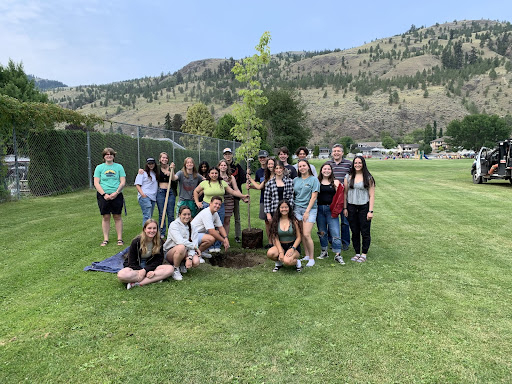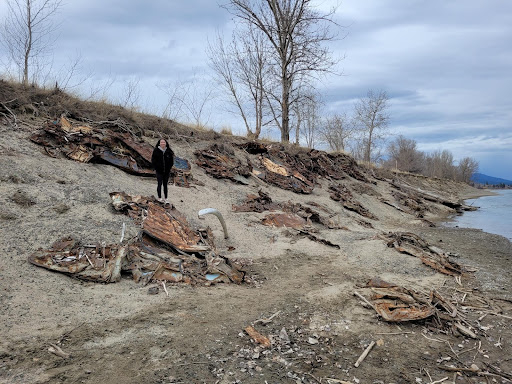These in-their-own-words pieces are told to Patricia Lane and co-edited with input from the interviewee for the purpose of brevity.
Parker Morrison is leading her community’s efforts in Kamloops, B.C., to get rusted cars out of a bank on the Thompson River.
For decades, Kamloops residents have been unable to persuade the municipality or the federal Department of Fisheries and Oceans (DFO) to take responsibility for clearing out the toxic debris. This 17-year-old is a recipient of the Institute for Sustainable Education and Action (I-SEA) 2023 Youth Climate Activism Award for succeeding in getting things moving.

Tell us about your project.
In the 1970s, it was common to use old cars to shore up riverbanks. Unsurprisingly, since the bank has eroded and they are still there, they spill out onto a public path and the beach in our Centennial Park. The debris is unsightly and dangerous for pedestrians and wildlife. It should be removed and disposed of safely so we can implement nature-based solutions, such as riparian restoration and planting native trees to control erosion.
How did you get involved?
I was curious about the cars. In 2023, I researched how they got there and how to get them sustainably removed as my Grade 12 capstone project. Fixing it seemed relatively simple but no one was doing it. One day, I just decided if not me, then who?

What did you learn?
The City of Kamloops explained that since it concerns a riverbank, it is the responsibility of the federal government. The DFO said since it was in a city park, their hands were tied. I saw that when they acted alone, they each saw it as someone else’s problem, but perhaps together they would act.
Jason Hwang from the Pacific Salmon Foundation gave a presentation to my Westsyde Secondary School climate club about the foundation’s work across B.C., including restoring salmon habitat. I approached him and he said he would support me. He put me in touch with a biologist inside DFO who helped bring the department to the table. He also reached out to the Secwepemc Fisheries Commission and now they want to be involved, too.
When I asked a local engineering firm to assess the problem, they connected me with a municipal staff person who helped bring the city on board. I have lots of support from local residents and businesses and am raising money to ensure the plan we have developed can be implemented. People are very supportive and enthusiastic and I hope that by this time next year, the cars will be gone and the restoration work underway.

How did the way you were raised impact your decision to get involved?
I was outdoors a lot as a kid and still am now. My mom runs a daycare and we spent most of our early childhood outside. Our family has a cabin on nearby Surrey Lake. My sister and I would spend all day outside swimming, quadding and exploring the forest around us. I was directly affected by the consequences of climate change, such as yearly wildfires and floods.
As a child, I was obsessed with plants and their capacity to draw carbon from the air and return oxygen, and kept a notebook. I delighted in telling my parents that a common houseplant, like a spider plant for example, could clean the air and support good sleep. My parents strongly encouraged these tendencies and were a willing audience when I talked about my discoveries.
Mr. Beeds, the advising teacher at my high school climate club, has been so supportive of all my efforts and helped me explore how we can help fight climate change and be more sustainable, both as a school and as individuals.

What makes this project challenging?
Having the confidence to keep going can be hard, especially since it is taking longer than I had hoped. I am hopeful that the long process will be well worth it in the end.
What keeps you going?
My friends’ support in the climate club got me through the last eight months. It is so inspiring to hear older people in my community say how happy they are to see this finally get going. Sometimes strangers in the community send me messages of encouragement, which is awesome.
What do you see if you succeed?
These car-filled riverbanks are not rare in British Columbia. There is another in Kamloops and many in the Fraser Valley. I hope we set a path for others to get their riverbanks cleaned up, too.

What would you like to say to other young people?
If you have an idea, start! There is plenty of good news if you just look. And network, network, network. I would never have even begun if I had not approached Mr. Hwang, who used his contacts to get DFO interested. I got the city engaged by using a network rather than a direct approach. You might be just one person, but working with the people you know and the people they know can often get you where you need to be.
How about older readers?
Supporting young people and their endeavours to fight climate change helps create community and hope.







Comments